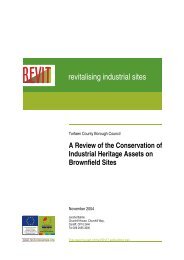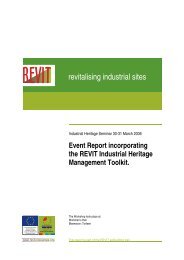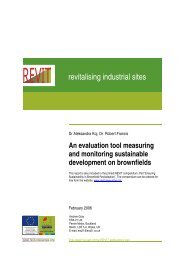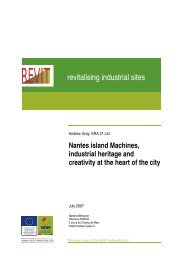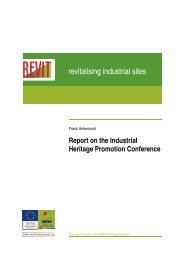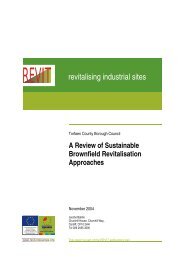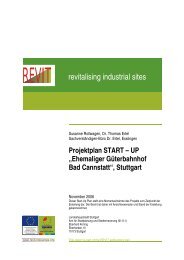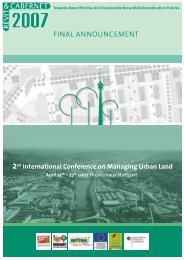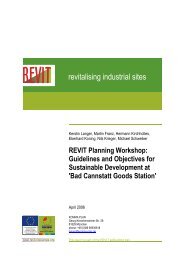DG State Aid – Control and Regeneraton of Deprived Urban ... - REVIT
DG State Aid – Control and Regeneraton of Deprived Urban ... - REVIT
DG State Aid – Control and Regeneraton of Deprived Urban ... - REVIT
Create successful ePaper yourself
Turn your PDF publications into a flip-book with our unique Google optimized e-Paper software.
NN11/2002<br />
Individual cases <strong>of</strong> application based on the<br />
National Heritage Memorial Fund<br />
The National Heritage Memorial Fund scheme provides financial assistance to projects <strong>of</strong><br />
importance to National Heritage within the UK. These could be things <strong>of</strong> any kind which are<br />
<strong>of</strong> scenic, historic, archaeological, aesthetic, architectural, engineering, artistic or scientific<br />
interest. The aim <strong>of</strong> the scheme is to safeguard <strong>and</strong> enhance the heritage <strong>of</strong> buildings, objects<br />
<strong>and</strong> the environment so that they can be enjoyed by the general public <strong>and</strong> h<strong>and</strong>ed on to future<br />
generations.<br />
Any type <strong>of</strong> project is eligible for support under this scheme as long as it is important<br />
for the national heritage <strong>and</strong> there is a benefit for the public. Examples include<br />
buildings, historic townscapes, historic parks, monuments, projects based on language<br />
heritage, archives <strong>and</strong> exhibitions.<br />
In the majority <strong>of</strong> cases support will be in the form <strong>of</strong> a grant, however, loans or other<br />
methods such as a voucher system are also available. Given the variety <strong>of</strong> projects funded<br />
under this scheme, the support may be granted for a number <strong>of</strong> reasons. The construction <strong>of</strong><br />
buildings, conservation, repair <strong>and</strong> restoration, improving the housing <strong>and</strong> storing <strong>of</strong><br />
collections, education, exhibiting <strong>and</strong> maintaining archives are some examples.<br />
As this scheme involves a large variety <strong>of</strong> projects that can be supported, the Commission<br />
had difficulty analysing its compatibility with the state aid rules. The Commission agreed<br />
with the UK authorities that a number <strong>of</strong> the projects did not meet all <strong>of</strong> the conditions under<br />
Article 87(1) EC Treaty, hence state aid was not involved. However, the Commission stated<br />
that it could not exclude the fact that these funds may advantage undertakings active in sectors<br />
where there was trade <strong>and</strong> competition between Member <strong>State</strong>s. Therefore, the Commission<br />
examined this scheme under Article 87(3)(d) <strong>of</strong> the EC Treaty.<br />
Given the various types <strong>of</strong> projects supported, the Commission split the eligible projects into<br />
two categories, the renovation <strong>of</strong> buildings <strong>and</strong> other physically built heritage objects <strong>and</strong> the<br />
conservation <strong>of</strong> intangible heritage assets, intangible conservation for heritage assets <strong>and</strong><br />
tangible objects other than physically built. For the renovation <strong>of</strong> buildings <strong>and</strong> other<br />
physically built heritage objects, the Commission found that as the costs were limited to the<br />
additional heritage related costs for retention or appropriate repair, this aid promoted heritage<br />
conservation without affecting trade <strong>and</strong> competition to an extent contrary to the common<br />
interest in the meaning <strong>of</strong> Article 87(3)(d) <strong>of</strong> the EC Treaty. Concerning the second category,<br />
the Commission decided that there was a strong beneficial aspect for various areas <strong>of</strong> life <strong>and</strong><br />
these benefits for the public could not be measured in financial terms. Additionally, the<br />
Commission stated that the conservation <strong>of</strong> cultural heritage is a recognised mutual benefit for<br />
all European citizens. Therefore, the Commission decided it was appropriate to fund up to the<br />
entire project costs, if the project provides free access for the public. Where the project leads<br />
to a cost for the public, funding may be justified in order to cover those project costs that can<br />
not reasonably be expected to be covered by other incoming finances. To conclude, the<br />
Commission found this National Heritage Memorial Fund scheme to be compatible with<br />
Article 87(3)(d) <strong>of</strong> the EC Treaty given that it promotes culture <strong>and</strong> preserves heritage.<br />
49



